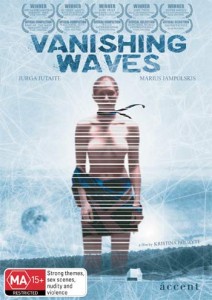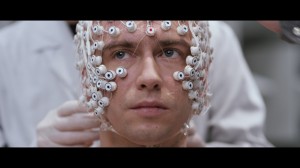
How many colours are there in a field of grass to the crawling baby unaware of Green?
Stan Brakhage
“The human brain is a fantastic machine,” declares one of the researchers in Lithuanian director Kristina BuožytÄ—’ solemn science fiction film Vanishing Waves. Warmth and comedic relief are bypassed. There are no laser battles. The battle is interior, a place where human personality presents as ultimate transforming alien. Vanishing Waves is a speculative work about the liquid nature of identity and ontological potentials.
Aurora (the original title of the film) played by Jurga Jutaité has been left in a coma following a severe road accident. Scientist Lukas (Marius Jampolskis) is consequentially plugged into her neural pathways via some swanky “70s inspired headgear and a capsule that references Kubrick’ monolith repurposed as a scientific coffin. This invasive activity is made murkier from the onset when contact with Aurora becomes a sexual occupancy for Lukas. Lukas deceives his co-workers and wife about what he is really experiencing inside the head of his beautiful car crash victim.
The ethical quandary around patient consent is not explained and the precarious and often violent pursuit of intimacy Lukas undertakes with Aurora — within her subconscious — is dubious. BuožytÄ— represents the patriarch trying to oppress what might be considered the last safe space left for a woman. The film could have empowered her as a less erratic force and still held the narrative together, but perhaps the suggestion is that Aurora’ severe head injury makes her unconscious state susceptible to the subjugation of this binary relationship.
Overall, thematic content is refreshingly dense. Buožytė audaciously steers genre into a portal of clashing sensory information, perception as code, and the paradox of transpersonal status. Stunning work is made of 360-degree pans and a monochromatic palette in order to express the dichotomy that exists between the physical and psychological connections existing in the duel worlds that Vanishing Waves inhabits. Mental subjectivity shifts and melts into amorphous overdrive (literally in one orgy scene).
Although Vanishing Waves challenges contemporary science fiction cinema it is deeply rooted in retrospective futurism — the aforementioned Kubrick, and Tarkovsky’ Solaris most apparent. Peter Von Poelh’ soundtrack is a shining example of combining strong historical influences. An ambient platform underpins the machinery of cruel science throughout, while the advent of Aurora’ consciousness brings a more classical imagining to the music of the brain. When the point of resolution arrives in the third act the soundtrack undertakes a mind-meld of its own, crowning an elegiac sequence in anthemic Mogwai territory.
Aurora’ mind space is a liminal wonderland of the pure and the spooked (one of my notes was “Ikea with AIDSâ€). Anatomy morphs with landscape and into the geometric possibilities of cerebral networks. It is here Vanishing Waves is at its most powerful, forming a fresh spore where pure cinema and genre fester. A place an audience can cheat with a phantom and drink gray wine.




